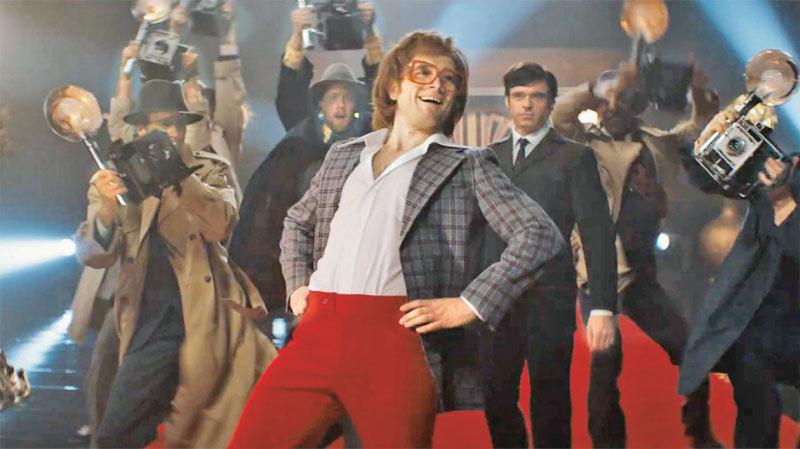
 Taron Egerton does a good impression of the flamboyant musician in this sucrose treatment, a by-the-numbers approach authorised by Elton himself
Taron Egerton does a good impression of the flamboyant musician in this sucrose treatment, a by-the-numbers approach authorised by Elton himself
“When are you going to hug me?” That question echoes around Dexter Fletcher’s dazzling rock opera – a fantastical account of the highs and lows of Elton John’s wild-ride rise, told in frenetically full-blooded musical form. It’s the story of a little boy who became a big star while plaintively pleading “I want lurrve, but it’s impossible”; a shy kid who must learn to play-act confidence after enduring a childhood that would have struck a chord with Philip Larkin. Yet unlike the problematically rejigged chronology of Bohemian Rhapsody (which Fletcher rescued from disaster), this proudly nonlinear treat puts its jukebox soundtrack on shuffle, wittily deploying tunes to fit the mood rather than the timeline.
We open with Egerton’s Elton, preposterously attired in horned-demon garb, striding into rehab group therapy, where he declares himself to be an alcoholic, cocaine addict, sex addict, bulimic, shopaholic and more. From here, we flash back to key moments in Elton’s life, played out as extravagantly choreographed musical numbers – the Crocodile Rock of his blue-touch-paper appearances at the Troubadour in LA, where Elton appears to fly; the Honky Cat prowl of success with lover/manager John Reid (a slimy-sexy Richard Madden); the mournful cry of Goodbye Yellow Brick Road, as lyricist Bernie Taupin (Jamie Bell) realises they’re not in Kansas anymore.
It’s an audacious framing device by Billy Elliot writer Lee Hall, recalling the vaudevillian theatricality of the Ian Dury biopic Sex & Drugs & Rock & Roll, which similarly cast its pop-star ringmaster as an unreliable narrator. There’s real tragicomic pathos in the sight of someone variously dressed as a queen, a fiery angel and a fluorescent bird in a gilded cage struggling to make sense of their increasingly crazy life. Throughout, Egerton (who impressively does all his own vocals) uncannily captures the blend of bare-chested bravado and rabbit-in-the-headlights terror that made Elton one of glam rock’s most intriguingly vulnerable figures.
From an early snog with a 1960s soul-revue musician to a cherry-popping sex-scene played out to the strains of Take Me to the Pilot, there’s none of the coyness that won Bohemian Rhapsody a family-friendly PG-13 rating in the US. This is altogether more frank fare – and all the better for it. Yet despite the carnivalesque bustle of sex and drugs, the real centre of the drama is a low-key love story between John and Taupin – two songsmiths thrown together by fate, each driven by, and dependent upon, the other. “Hand in hand went music and the rhyme” sang Elton on his autobiographical 1975 album Captain Fantastic and the Brown Dirt Cowboy, and Fletcher’s film brilliantly recaptures that sense of creative intimacy, whether it’s Bernie talking cowboy-dreams over cups of tea, or Elton knocking out the tune for Your Song in the time it takes to have a shave. No wonder Elton’s life falls apart when Bernie decides to un-plant himself from their penthouse lifestyle and go back to his plough.
Having brought gutsy oomph to the cheerfully cheesy Sunshine on Leith, actor turned director Dexter Fletcher (who debuted as an actor in Alan Parker’s Bugsy Malone) here proves himself the master of the modern screen musical. There’s breathtaking confidence in a sequence that projects young Reggie Dwight from childhood to adulthood via an exuberant fairground dance, played out to the strains of Saturday Night’s Alright (For Fighting). Later, the film dances between ambulance and amphitheatre in a manner reminiscent of Bob Fosse’s All That Jazz. I also spied the influence of Ken Russell, the director who put Elton in comically oversized bovver-boots in Tommy, and would doubtless have approved of Fletcher (whom he directed in Gothic) evoking old MGM musicals as he throws his hero into a trippy spin, climaxing with a hallucinatory human-firework sequence. Elsewhere an overhead shot of a coked-out disco orgy looks like an outtake from The Devils, interspersed with kaleidoscopic flashes of Lawrentian male wrestling.
In significant supporting roles, Bryce Dallas Howard plays Elton’s mum, Sheila, torn between nurture and narcissism, and Stephen Graham is a hoot as gruff music publisher Dick James. The film’s musical director, Giles Martin, (son of George) works imaginative wonders reconfiguring Elton’s astonishing back catalogue, while production designer Marcus Rowland conjures disparate worlds through which George Richmond’s fluid cameras follow Egerton’s shining star. But for me, Fletcher is the real star of this show, a director whose enthusiasm for musical storytelling shines through every frame, hitting all the emotional high notes. - Guardian
